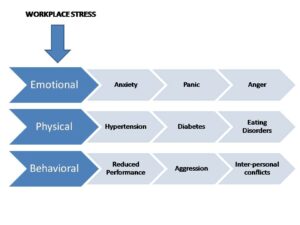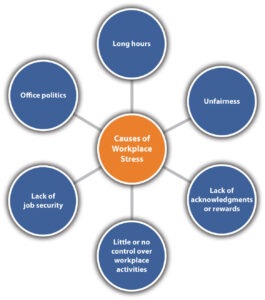Contents
Stress Counseling At The Workplace

Stress counseling is a process that helps people cope with stress in their life. With the help of stress counseling at the workplace. An employee can understand what stress is and how it affects them, learn to manage their thoughts and feelings. And talk about how they feel with someone who will not judge them. Stress counseling sessions can be provided in a group or one-on-one setting, either by a professional counselor or a peer counselor. The sessions may last from half an hour to two hours, depending on the length of each session and the preferences of those attending.
Stress is a natural part of life. But when it’s too much, the body can break down and cause serious health problems. A recent study found that two-thirds of employees in the UK are living with high levels of stress. Yet many don’t know how to cope with their emotions or what to do about them. The worst thing you could do, however, is nothing at all. Educate your employees on how to identify their stress triggers and develop strategies for managing your stress levels through self-care activities like yoga or meditation or by seeking professional help if necessary.
What Is Stress Counseling?

Stress counseling at the workplace is a technique that offers an opportunity to discuss and deal with stress-related issues. That may be causing problems in one’s life. A qualified counselor listens, provides feedback, and offers methods for coping with stressors.
“Stress counseling at the workplace can also help reduce absenteeism through counseling related to mental health”
Stress counselors are employed in industries all over the world including, but not limited to, consulting, banking, insurance agencies, telecommunications companies, manufacturing plants, hospitals, and healthcare systems. There are many reasons why employees seek out stress counseling at work including mental health issues such as depression or anxiety. The article says that when people feel they can trust their employer and their employer trusts them, employee absenteeism is minimized.
Stress counseling at the workplace is not only beneficial for the employee but also the company’s productivity because of helps with mental health issues. And stress counseling can help decrease absenteeism at work. Absenteeism refers to the number of days employees are absent from work. In this article, stress counseling is used to help those who have been experiencing intense anxiety or depression. They may feel embarrassed to go to their regular physician or therapist because they believe that those around them will not understand what they are going through and the reason for their absence from work. Counseling in the workplace eases this by letting employees know they are not alone in what they are going through and that there is always help for when they need it.
Stress counseling can be an effective tool for both sides when working together because many people may suffer from mental illness but feel they will lose their job if others were to find out.
How To Identify The Causes Of Stress?

Causes of stress at work can vary depending on the person that is experiencing it. Some sources say that long hours, physical injury/illness, and poor-relationship with a colleague are some examples of causes of stress at work. Inability to control one’s own destiny is another cause of stress. Because people may feel they have no control over their work or how they should be doing their job.
The causes of stress in the workplace may vary from job type to job type. For example, a factory worker would be dealing with a different type of stress than a public speaker would. There are many types of jobs where a person could experience stress. Including consulting banking, insurance agencies, telecommunications companies, manufacturing plants, hospitals, and health care systems.
Signs Of Stress In The Workplace
Symptoms of stress at work can also vary depending on who is experiencing the symptoms and what type of job they have. These symptoms may include stomach aches or ulcers, chest pain/heart problems, headaches, difficulty breathing or respiratory illness, fatigue, tiredness, etc.
Signs of employees having stress at work may vary depending on the position one has at the workplace. For example, lower-level office jobs generally have fewer physical symptoms than factory workers. Symptoms may include-
- Anxiety or restlessness
- Lack of concentration or decision-making skills
- Poor memory or decreased ability to learn new things
- Irritability
- Anger outbursts
- Depression
- Isolation from others, and other mental health issues
Who Is At High Risk Of Developing Stress?
People in high-stress jobs tend to be more at risk for experiencing stress in the workplace because of their career choice. High-stress jobs include police officers, firefighters, social workers, nurses, doctors, and other professions that deal with human suffering.
People at risk for developing stress in the workplace depend on the job they have. For example, someone who works in a hospital may be at risk for developing stress than someone who is working in an office setting. People who are considered high risk for experiencing stress include those who are new to their job, have a history of mental health issues, are in an abusive relationship, or have recently experienced the loss of a family member.
What Can Employers Do Help Workers With Stress?
There are many different things that people can do when they feel that they are having issues coping with their work-related stress. Some tips for managing this type of stress include keeping a calendar of activities, prioritizing activities, and planning rewards.
Employee Assistance Program

Employers may implement or offer different types of programs that will help their employees cope with stress while at work. Some companies might require that their employees go to counseling to learn how to deal with stress. While other companies may offer programs or seminars on workplace stress management.
Employers can help their workers cope with stress by offering workshops and seminars. Some people may need individual therapy sessions or group classes in order to help cope with their issues surrounding stress. Having an employee assistance program for workers in the workplace is another way employers may help their employees cope with stress, especially in times of crisis.
Self-care Activities
 There are many different ways that workers can manage their stress at work such as taking a walk or talking to a coworker. The ones who they trust or just taking some time away from the workplace.
There are many different ways that workers can manage their stress at work such as taking a walk or talking to a coworker. The ones who they trust or just taking some time away from the workplace.
Some tips for coping with work-related stress include keeping a calendar of daily activities, prioritization of work tasks, and planning rewards, such as time off. Other tips may include taking a long lunch break to walk outside, talking to a co-worker about the stress or just taking some time away from work.
Many organizations offer wellness programs through yoga or meditation classes that are held in the office. This is a great way for employees to take some time out during their workday and complete tasks with a clear mind. Although stress counseling at the workplace has been around for decades, it’s becoming more popular as people become aware of its value.
Self-care activities such as meditation and yoga can help manage stress levels. Other support services available include counseling, mental health checks, and financial assistance for carrier of employees that experience anxiety or depression. Organizations also provide anonymous online assessments to diagnose anxiety and depression.
Stress Counseling
It’s important for employees to have access to stress counseling at the workplace because it can reduce absenteeism, increase productivity and benefit work-life balance. Employees need support to understand what triggers their stress levels and how they can stop them from boiling over.
Employees may experience a range of emotions at work, from feeling particularly anxious or uncomfortable. This is because stress can happen for a number of reasons such as having unresolved issues with colleagues or family members, reacting impulsively to situations, and worrying about the future. In almost all cases, employees tend to miss out on self-care activities. That help them recharge and recover from heavy workloads.
Employees need to be aware that stress counseling at the workplace is available to them. If they want to deal with their issues more quickly. By visiting a psychologist or counselor, employees can continue with their usual duties without worrying about putting extra pressure on themselves.
Both employers and employees are happy when there are resources available to assist them with their mental health and wellbeing. Some organizations provide free clinical assessments that can help employees better understand how they are experiencing stress levels, anxiety, or depression in the workplace.
Employees are more likely to manage their stress levels if individual counseling is available for them. The purpose of stress counseling at the workplace is to take time out from work. So employees can focus on self-care activities that help them return refreshed and rejuvenated. Employees benefit when they have access to exercise facilities or yoga classes, which reduce stress levels.
When employees are able to manage their stress levels, they’re more likely to approach work with a positive mindset. Stress counseling at the workplace can help them perform better at work because it’s another step towards achieving organizational goals.
Benefits Of Stress Counseling

Stress counseling at the workplace benefits employers because they gain motivated employees that feel better about their work. Employees can use self-care activities such as meditation and yoga to manage stress levels. So they don’t experience burnout in the office.
Employees who feel valued by their employers are more likely to go the extra mile when completing projects and meeting important deadlines. It’s therefore critical that an employee assistance program is available for consultation during work hours. This allows employees to learn more about wellness programs that help them manage stress levels when they arise.
In conclusion, stress counseling at the workplace benefits both employers and employees. As it’s a positive step towards achieving work and personal goals. Employees can use self-care activities such as yoga and meditation to manage their stress levels. So they remain productive at work. By visiting a psychologist or counselor, employees can continue with their usual duties. And that too without worrying about putting extra pressure on themselves.
Many organizations are making wellness programs available through lunchtime yoga or meditation classes that are held in the office. This is a great way for employees to take some time out during workday and complete tasks with clear mind. Although stress counseling at the workplace has been around for decades. It’s becoming more popular as people become aware of its value.
Employees who feel valued by their employers are more likely to go the extra mile when completing projects and meeting important deadlines. It’s therefore critical that an employee assistance program is available for consultation during work hours. This allows employees to learn more about wellness programs that help them manage stress levels.
A Word From Mantra care
Do you want to keep your employees happy, healthy, and productive? Join our employee assistance program and get a healthier workplace.


